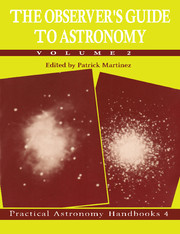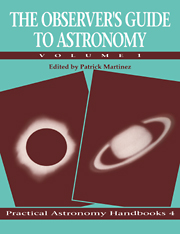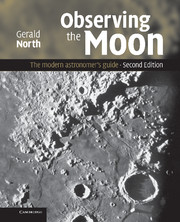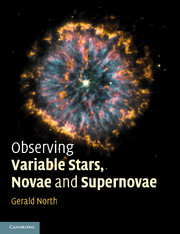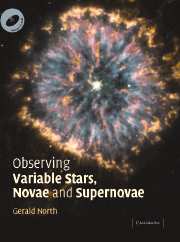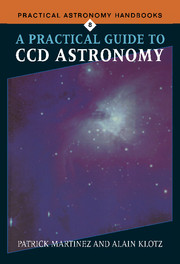The Observer's Guide to Astronomy
How can you find new minor planets, comets and novae? How can you use photoelectric detectors to derive the temperatures of stars? And how can you predict future eclipses and occultations of stars by minor planets? The questions asked by serious amateur astronomers are answered in this authoritative and wide-ranging guide, first published in 1994. For each topic, sound practical methods of observation and the scientific background are given to lead you to better observations. Guidelines also show you how to record and catalogue your observations using the recognised professional terminology and classification schemes. From the simplest pencil drawings of the moon to observations of the most distant galaxies with state-of-the-art CCD cameras and photoelectric photometers, this guide is packed with practical tips for all types of amateur observations. It will develop the observational skills of the keen novice and satisfy the more demanding needs of the experienced amateur astronomer.
- Packed with practical tips on all methods of amateur observations of all types of astronomical objects
- Gives you the background theory to develop your scientific understanding and improve your observational skills
- Shows you how to record your observations using the professional classification schemes
Reviews & endorsements
'These two volumes, together, constitute amazingly good observational guides for the serious amateur astronomer.' Spaceflight
' … serious astronomy for the serious amateur astronomer ... This is an indispensable volume for practical astronomy … it is recommended for all libraries.' Reference Reviews
'This two-part observer's guide is the most comprehensive that this reviewer has encountered, well-illustrated and with a very readable text … any aspiring amateur would do well to obtain both volumes as a reference text, which would stand them in good stead for years to come.' Richard Miles, Journal of the BAA
'This is a gem of a book … it is a grand smorgasbord of material for the advanced amateur astronomer … Each of the ten chapters is meant to stand alone as an independent unit … this way the reader does not have to digest the entire book in order to get to what he/she needs to observe … The book is quite irresistible … well written, well organised and nicely cross-referenced … highly recommend this book to any serious observer. It was worth the pain of writing a review just to get my hands on a copy of it!' Journal of the Royal Astronomical Society of Canada
Product details
September 1994Hardback
9780521452656
569 pages
255 × 179 × 33 mm
1.302kg
292 b/w illus. 20 maps 69 tables
Temporarily unavailable - available from TBC
Table of Contents
- Volume 1: Contents (Volumes 1 & 2)
- The contributors
- Summary (Volumes 1 & 2)
- Preface
- Translator's preface
- 1. The Sun
- 2. Observing the Sun with a coronograph
- 3. Solar eclipses
- 4. The Moon
- 5. Planetary surfaces
- 6. Planetary satellites
- 7. The minor planets
- 8. Comets
- 9. Occultations
- 10. Artificial satellites
- Notes, references and bibliography - Volume 1. Volume 2: Contents (Volumes 1 & 2)
- The contributors
- Summary (Volumes 1 & 2)
- 11. Aurorae
- 12. Meteors
- 13. Double and multiple stars
- 14. Variable stars
- 15. Deep sky novae and supernovae
- 16. Plate comparisons
- 17. Astrometry
- 18. Spectroscopy
- 19. Photoelectric photometry
- 20. Image-intensifiers and CCDs
- Appendices:
- 1. Time scales
- 2. The T60 Association
- Notes, references and bibliography - Volume 2.

